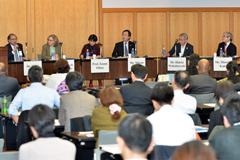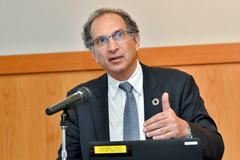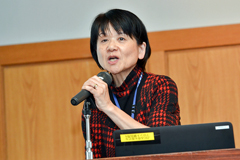What is Needed to Achieve the SDGs? Seminar Hosted in Tokyo on Publication of a Book on Joint Research with the Brookings Institution
2019.01.22
On Dec. 3, 2018, the seminar "From Summits to Solutions: What are the innovative ideas that could help the world reach the Sustainable Development Goals?" was held in Tokyo to commemorate publication of the book “From Summits to Solutions: Innovations in Implementing the Sustainable Development Goals.” This book is the outcome of joint research conducted by the JICA Research Institute (JICA-RI) and the Brookings Institution. The seminar was also positioned as a side event of the T20 Japan 2019 Inception Conference that was held on the subsequent Dec. 4 and 5.

Panelists shared their different perspective on SDGs
First, JICA-RI Director Izumi Ohno gave her opening remarks, pointing out that this book has value from both an academic and a policy perspective by providing resolutions for problems faced by the international community. She expressed her hope that this seminar would, through the discussions among panelists, provide lessons learned for the G20 Summit that will be held in Osaka in June 2019.
To kick off the panel discussion, JICA Senior Vice President Hiroshi Kato, one of the book's editors, first described the background of publication of the book. He pointed out that compared to the Millennium Development Goals (MDGs), the Sustainable Development Goals (SDGs) encompass areas such as changing nature of issues themselves, necessary approaches, and actors involved. He continued to say that discussions about the SDGs are also important when thinking over Japan's future, and expressed his hope that participants could use this opportunity to consider what Japan could do.
Next, one of other editors, Homi Kharas, interim vice president and director of Global Economy and Development at the Brookings Institution, said that to break through the current delay in achieving the SDGs, a “system approach” is needed. This approach would start by identifying who the relevant stakeholders are and how some of the SDG goals are actually linked to each other. Kharas addressed three areas that particularly require change. The first is “Capturing Value.” For example, he said that today’s market economy is not generating the same kind of rewards or incentives for some values, whether it be gender, green bond, or the need to create infrastructure for low income countries. He continued to say that the market society is not delivering the solutions the society is demanding, so it is necessary to change the values by changing the market incentives. The second is “Targeting Places.” He said that this means narrowing down the regions for achievement of the SDGs and then taking action accordingly. The third is “Updating Governance.” Kharas emphasized the need to improve governance, stating that to achieve the SDGs it is necessary to have a system of incentives and accountabilities for each country and sector.

Homi Kharas, director of Global Economy and Development at the Brookings Institution
Elizabeth Sidiropoulos, chief executive of the South African Institute of International Affairs, explained the current circumstances. She said that in 2013, two years before the SDGs were established, African countries adopted “Agenda 2063,” a long-term vision related to African politics, economy, and society, through an agreement in the African Union (AU). She explained that this agenda shares many elements with the SDGs. She said obstacles to their achievement include insufficient funding of development and a lack of data needed for monitoring. Sidiropoulos also commented on South Africa's activities to achieve the SDGs, making it clear that the country placed importance on science, technology and innovation, included them in its national development plan, and was focusing efforts on inclusive development.
Ohno then returned to the stand and emphasized that involvement of the private sector was required for accelerating the achievement of SDGs as Kharas had mentioned. She said that if it is possible to collaborate with the private sector, it is expected that employment and investment opportunities will be created and it will also provide an opportunity for developing countries to participate in the global value chain. However, she said, it is important that companies, governments and academia build good partnerships, that companies take responsibility to establish sustainable value chain management, that developing countries build the capacity to industrialize in economic, social, and environmental aspects, and that corporate behavior is monitored and proper incentives are given.

JICA-RI Director Izumi Ohno
In addition, Masao Seki, chair of the Task Force on Keidanren’s Charter of Corporate Behavior of Keidanren (Japan Business Federation), explained Keidanren's initiatives to achieve the SDGs. He mentioned that Keidanren has set the goal of achieving “Society 5.0,” which optimizes society overall by fully utilizing innovative technology. He said this is also aligned with the philosophy of the SDGs. He also pointed out that their Charter of Corporate Behavior had been revised in 2017, newly adding "Sustainable economic growth and the resolution of social issues" and "Respect for human rights."
Finally, Hideki Wakabayashi, director of the Japan NGO Center for International Cooperation (JANIC) introduced the activities of the Japan Civil Society Network on SDGs (SDGs Japan), a civic group established in 2016. The organization recommends issues with an emphasis on human rights, such as support for the children of foreigners living in Japan and anti-bullying measures, and aims to strengthen the action plans of the Japanese government. Wakabayashi emphasized that it is important to keep in mind that we are all private citizens before we are government officials or businesspeople, and to consider what we can do.
There were many questions from the floor during the Q&A session, such as "What should be done when it is difficult to reform governance, such as in areas of conflict or other severe conditions?" and "How should we handle areas that have been left behind in efforts to achieve the SDGs?" and discussions continued lively.

事業事前評価表(地球規模課題対応国際科学技術協力(SATREPS)).国際協力機構 地球環境部 . 防災第一チーム. 1.案件名.国 名: フィリピン共和国.

事業事前評価表(地球規模課題対応国際科学技術協力(SATREPS)).国際協力機構 地球環境部 . 防災第一チーム. 1.案件名.国 名: フィリピン共和国.

事業事前評価表(地球規模課題対応国際科学技術協力(SATREPS)).国際協力機構 地球環境部 . 防災第一チーム. 1.案件名.国 名: フィリピン共和国.

事業事前評価表(地球規模課題対応国際科学技術協力(SATREPS)).国際協力機構 地球環境部 . 防災第一チーム. 1.案件名.国 名: フィリピン共和国.

事業事前評価表(地球規模課題対応国際科学技術協力(SATREPS)).国際協力機構 地球環境部 . 防災第一チーム. 1.案件名.国 名: フィリピン共和国.
scroll